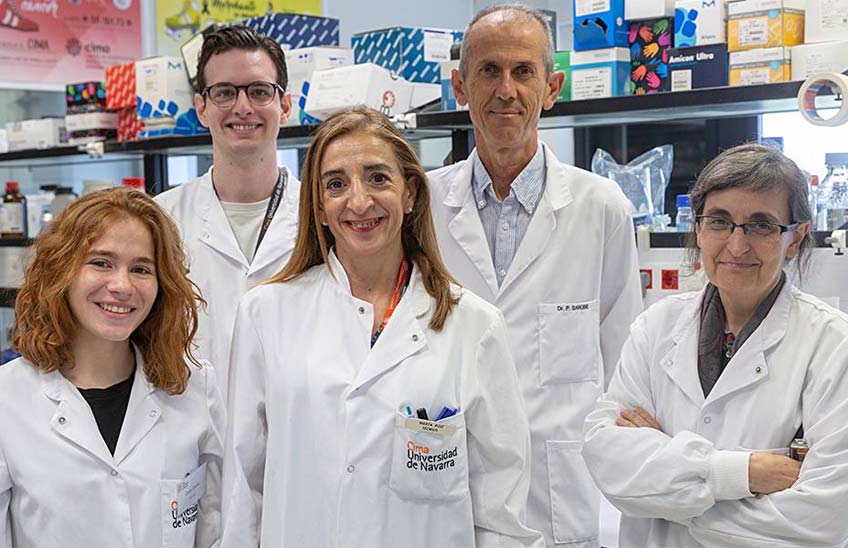Microproteins found in tumors that could lead to the development of cancer vaccines
Using state-of-the-art tools, these small molecules have been identified in samples from more than a hundred tumors. The Cima University of Navarra participates in this work led by the Institute of research of the Hospital del Mar.

FotoManuelCastells
/From left to right: Carla Castro, Patrick Theunissen, Marta Ruiz, Dr. Pablo Sarobe and Dr. Puri Fortes.
16 | 07 | 2024
A work led by the Institute of research of the Hospital del Mar, with the participation of the Cima University of Navarra and the Universitat Pompeu Fabra, has identified a group of small molecules exclusive to liver tumors that can become the core topic to develop vaccines against cancer. These are microproteins, proteins of a very small size, which are only expressed by tumor cells.
"We have seen that some of these microproteins are able to stimulate the immune system, which could generate a response against cancer cells. And we can augment this response with vaccines, similar to coronavirus vaccines, but which produce these microproteins. Specifically, these vaccines could stop or reduce tumor growth," explains Puri Fortes, researcher at Cima and CIBERehd.
The researchers responsible for work have identified this set of microproteins thanks to the integration of data tumor and healthy tissue from more than one hundred patients with liver cancer. In fact, these small molecules are generated from genes that until recently were thought not to have the capacity to encode proteins. "In recent years, more and more attention is being paid to this group of genes that, because of their short length or low expression, have been considered as genes with no protein-giving capacity. New techniques have made it possible to discover that a set of these genes can give rise to small proteins," says Mar Albà, ICREA researcher at the Institute of research of the Hospital del Mar. The study has been published in the latest issue of the journal Science Advances.
To make this possible, a combination of different computational techniques such as transcriptomics, translatomics and proteomics has been used, together with experiments at laboratory aimed at studying the immune response.
Possible gateway to a cancer vaccine
The development of cancer vaccines is based on the immune system's ability to recognize as foreign that which is not part of the body. Mutations that occur in cancer cells generate foreign peptides, which alert the immune system. But the problem lies in those types of cancer that have low mutation rates, such as liver cancer, fees . The study of microproteins, which until now were difficult to detect, is an alternative. "This work shows that there is an important issue of microproteins expressed exclusively in tumor cells that could be used to develop new treatments," explains Marta Espinosa Camarena, a researcher at the Hospital del Mar.
In this case, unlike other types of vaccines that are based on patient-specific mutations, this treatment could be used in a variety of individuals, as the same microprotein has been shown to be expressed in a variety of patients.
The administration of these vaccines could be relatively simple, even though research has not yet been launched for their application. "That is our goal", the researchers indicate.
reference letter bibliography:
→ Marta E. Camarena et al., Microproteins encoded by noncanonical ORFs are a major source of tumor-specific antigens in a liver cancer patient goal-cohort. Sci. Adv.10, eadn3628(2024). DOI:10.1126/sciadv.adn3628




